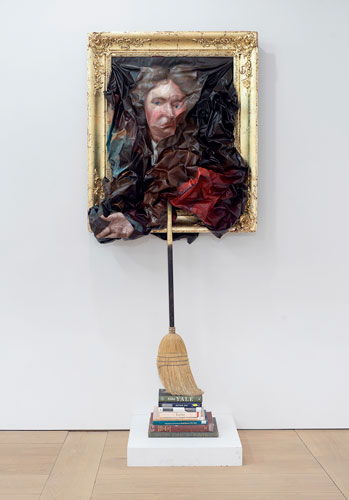 Titus Kaphar (b. 1976) Unfit Frame, 2016. Oil on canvas with gilded antique frame, books, broom, and platform. 94.5 inches x 39 inches x 24 inches. Collection of the Art Fund, Inc. at the Birmingham Museum of Art. Purchased with funds provided by the Collectors Circle of Contemporary Art.Enjoy free art and music after work at “Chamber Music @ AEIVA,” 5 p.m. Thursday, Nov. 2, at the University of Alabama at Birmingham.
Titus Kaphar (b. 1976) Unfit Frame, 2016. Oil on canvas with gilded antique frame, books, broom, and platform. 94.5 inches x 39 inches x 24 inches. Collection of the Art Fund, Inc. at the Birmingham Museum of Art. Purchased with funds provided by the Collectors Circle of Contemporary Art.Enjoy free art and music after work at “Chamber Music @ AEIVA,” 5 p.m. Thursday, Nov. 2, at the University of Alabama at Birmingham.
Presented in collaboration by the College of Arts and Sciences’ Department of Music and the Abroms-Engel Institute for the Visual Arts, “Chamber Music @ AEIVA” connects chamber music with the visual arts. The music for this performance was chosen in conjunction with the current exhibition “Titus Kaphar: Misremembered.” Kaphar appropriates different styles and techniques from past periods of art history to create reconstructive historical narratives that address issues of race throughout history,
Gallery viewing and a reception is at 5 p.m., and the concert is at 5:30 p.m. in the AEIVA’s Odess Gallery, 1221 10th Ave. South. The event is free and open to the public.
The sixth installment of “Chamber Music @ AEIVA” will feature the music of Hall Johnson, Lori Laitman and Antonin Dvořák. UAB music faculty Kristine Hurst-Wajszczuk, voice; Paul Mosteller, voice; Sarah Dennis, violin; Laura Usiskin, cello; Denise Gainey, clarinet; Yakov Kasman, piano; and Chris Steele, piano, will perform.
Two major series of works, many of which have never been exhibited in the South, are featured in “Titus Kaphar: Misremembered.” Also featured and marking its Birmingham debut is “Unfit Frame,” a mixed-media painting recently acquired by the Birmingham Museum of Art for its permanent collection.
The first half of “Misremembered” is Kaphar’s ambitious multimedia installation “The Vesper Project.” a life-sized, two-room, dilapidated house constructed inside AEIVA’s main gallery. Littered with debris and ravaged by neglect and vandalism, “The Vesper Project” reveals the complex fictional history of the Vespers, an African-American family passing for white in 19th century New England. Inspired by childhood memories of his aunt that turned out to be false, Kaphar’s installation acts as a deeply personal metaphor exploring how people, both as individuals and as larger cultures, construct our own memories and history.
“Misremembered” also pulls from Kaphar’s “Destiny” series, which presents painted composite portraits of women who share the given name Destiny and are currently serving time in the criminal justice system. These works explore the underlying racial issues found in the prison-industrial complex and seek to humanize those lost to this system whether guilty or innocent.